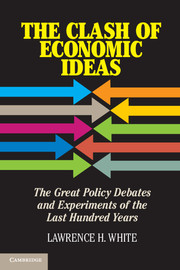Book contents
- Frontmatter
- Contents
- Figures
- Acknowledgments
- Introduction
- 1 The Turn Away from Laissez-Faire
- 2 The Bolshevik Revolution and the Socialist Calculation Debate
- 3 The Roaring Twenties and Austrian Business Cycle Theory
- 4 The New Deal and Institutionalist Economics
- 5 The Great Depression and Keynes’s General Theory
- 6 The Second World War and Hayek’s Road to Serfdom
- 7 Postwar British Socialism and the Fabian Society
- 8 The Mont Pelerin Society and the Rebirth of Smithian Economics
- 9 The Postwar German “Wonder Economy” and Ordoliberalism
- 10 Indian Planning and Development Economics
- 11 Bretton Woods and International Monetary Thought
- 12 The Great Inflation and Monetarism
- 13 The Growth of Government
- 14 Free Trade, Protectionism, and Trade Deficits
- 15 From Pleasant Deficit Spending to Unpleasant Sovereign Debt Crisis
- Index
- References
14 - Free Trade, Protectionism, and Trade Deficits
Published online by Cambridge University Press: 05 June 2012
- Frontmatter
- Contents
- Figures
- Acknowledgments
- Introduction
- 1 The Turn Away from Laissez-Faire
- 2 The Bolshevik Revolution and the Socialist Calculation Debate
- 3 The Roaring Twenties and Austrian Business Cycle Theory
- 4 The New Deal and Institutionalist Economics
- 5 The Great Depression and Keynes’s General Theory
- 6 The Second World War and Hayek’s Road to Serfdom
- 7 Postwar British Socialism and the Fabian Society
- 8 The Mont Pelerin Society and the Rebirth of Smithian Economics
- 9 The Postwar German “Wonder Economy” and Ordoliberalism
- 10 Indian Planning and Development Economics
- 11 Bretton Woods and International Monetary Thought
- 12 The Great Inflation and Monetarism
- 13 The Growth of Government
- 14 Free Trade, Protectionism, and Trade Deficits
- 15 From Pleasant Deficit Spending to Unpleasant Sovereign Debt Crisis
- Index
- References
Summary
Milton Friedman was asked to testify before the U.S. Trade Deficit Review Commission in 1999. He wore an Adam Smith necktie to the hearing, which led to the following exchange:
SHRINKING TARIFFS, GROWING TRADE
The logic of embracing free trade unilaterally, that is, no matter what policy any other national government adopts, is well expressed in an adage attributed to the economist Joan Robinson: Even if your trading partner dumps rocks into his harbor to obstruct arriving cargo ships, you do not make yourself better off by dumping rocks into your own harbor. In a world where few governments heed this logic, apparently because they think that they are giving up something by letting their consumers and businesses buy without artificial obstruction and should get something in return, multinational agreements may offer a face-saving way for governments to lower tariffs and eliminate other trade barriers in concert. The World Trade Organization was established in 1995 to provide a forum for negotiating and enforcing trade treaties covering its more than 150 participating nations. It succeeded a less formal club known as GATT, the General Agreement on Tariffs and Trade. GATT was established in 1947 with twenty-three member nations and expanded its membership over the years. There had been discussion at the Bretton Woods Conference about creating an “international trade organization” to accompany the World Bank and the International Monetary Fund, but the U.S. Congress did not then support the idea.
- Type
- Chapter
- Information
- The Clash of Economic IdeasThe Great Policy Debates and Experiments of the Last Hundred Years, pp. 360 - 381Publisher: Cambridge University PressPrint publication year: 2012



